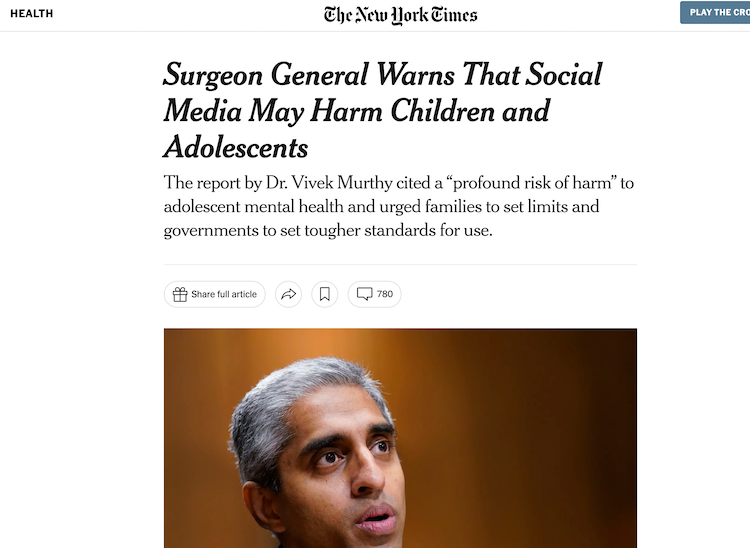Whether you're a parent or teacher, what are your options?
Teens are complicated. So are mental health and social media, so it’s important to take the right approach from the start.
Solutions being discussed range from suing and banning social media companies, to restricting teen use of social media, to setting a minimum age for social media access.
Some deserve a closer look, others might be a complete waste of time, but much more important than where are you start is that you make the choice to start. For the sake of their minds.

If you haven't already done so, make sure you watch our video.
It’s a great introduction to what research says about the connection between social media and teen health.
Experiment with time restrictions.
Studies have shown that reducing social media use to just 30 minutes per day and doing that for just a few weeks can make users much happier. Try that on your teens.
Have some honest discussions.
Ask them what they do on social media, if they feel addicted to it, how it makes them feel during and afterwards. Simply allowing them to talk and share could be helpful.
Talk to them about the algorithms.
Explain to them how the social media algorithms don’t share stories based on their interests, but only to keep them on for as long and profitable as possible.
Encourage them to think.
One of social media’s greatest dangers is that it co-opts teen thinking and curiosity. Neutralize that by encouraging your kids to think and question before simply accepting.
Encourage metacognition.
Teaching kids to think about how they think, to think about their thoughts, is key to preventing a takeover by negative thoughts.
Watch for problems.
It’s hard to spot excessive social media use when the average for half of all teen users is nearly 5 hours a day. But you’ll probably know excessive use when you see it.
Off with notifications.
The average teen user gets more than 400 notification every day, mainly from social media. Those pings alone have been shown to impact mental health and mood. So see if they’ll at least turn those off.
Understand the apps.
Not all apps are created equal, and some can be more damaging and dangerous than others. So do a little homework.
Turn it into an opportunity.
When they know that social media is simply addicting, exploiting, and manipulating them, your kids might just change their thinking.
Keep them off for as long as possible.
Do everything you can to keep your kids off social media until they’re old enough, at least 13 or 14. But the later the better.
Work on some time outs.
Try setting some rules that require your kids to put the phone down at certain times or after certain times.
Looks for alternatives and distractions.
Social media obsession often comes from boredom, so look for other ways and activities to alleviate that boredom.
Encourage them to verify.
Social media amplifies news and stories in ways that make them look more genuine than they really are. Encourage your kids to verify from other sources too.
Ask to join in.
See if your kids are willing to allow you to explore social media with them so you can better see and discuss what they’re seeing and experiencing.
Consider their current mental health status.
Kids already struggling with mental health issues, stress, anxiety, self-esteem issues etc., are more likely to experience more negative impacts from social media.
Ask about the positive.
Ask your kids about the communities, people, and feeds that make them feel happy, positive, optimistic, or connected, and use that to trigger a bigger conversation.
Encourage them to volunteer.
Surprise surprise, but the simple act of volunteering could fill in some of the gaps they’re searching for in social media. Plus a dozen other benefits.
Looking for more resources?
Download the free Teaching Digital Well Being guide from the Center For Digital Thriving at the Harvard Graduate School of Education.